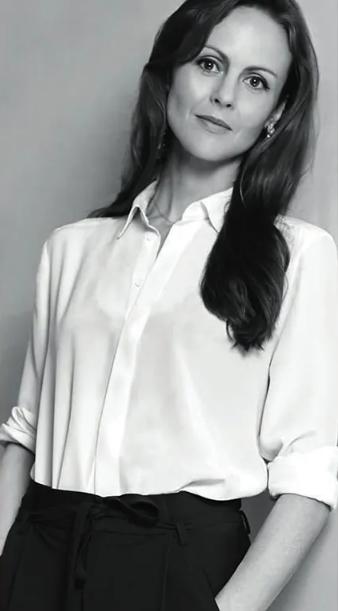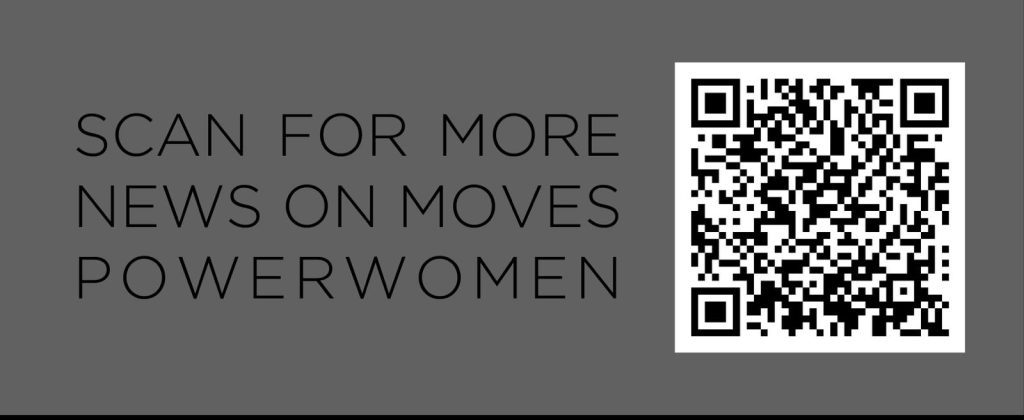Amber Sainsbury
Founder & CEO, Dramatic Need

In your opinion, what qualities make a “Power Woman”?
Tenacity. Self-release. The ability to take self-release and put it into others. You can’t just believe in yourself, you have to share that and believe in others. Take good risks because I don’t think women can succeed in this world without taking a risk because it is still true that we have to work harder, be smarter, think outside the box, and manage our time better than members of the opposite sex. I think compassion because I think compassion is female-kind’s real trump card and can become the advantage for us to wield power.
With all the different issues one could focus on, how do you balance your efforts in pursuit of gender equality? Is it a global approach or a specific issue that you are passionate about?
It’s something I very specifically work on with the girls who are in the Dramatic Needs program, supporting the girls and the individuals that we work with and their families as a whole. Gender equality isn’t just about supporting the girls. It’s also about the context of supporting and educating the boys. It’s all very well for girls to know their rights and stand up for them, but if the man in their life—-whether that be a father or a husband or a brother or a boyfriend—-if the male in their life doesn’t respect them or stand up for them or support them, then it’s kind of a moot point. On the ground, it is about female empowerment and we work with girls to teach their rights and self-esteem and self-respect and have them feel able to stand up for those rights. But, we also work quite closely with the boys, talking to them about why gender equality and women’s rights are so important because without them, half the population isn’t working or even contributing to their maximum and, instead, they are being suppressed and diminished and that doesn’t make for a better society or better working environment or better family environment. It’s better for girls and boys. I think both are important and I think that’s true globally as well.
If you could have someone else’s job for a day, who and what would it be? Why?
It sounds weird, but I would really like to be a neurobiologist for a day and know what I was talking about, obviously. I just find human behavior and why we do it so fascinating.
Why do you think women's reproductive rights are under attack? Globally it seems women's health and security are under such attack; from religion, to cultural attitudes, to lax government protection, women are more vulnerable than ever. What policies would you propose that he US government pursue (or change) to alter this.
This is very difficult for me to answer because, on a personal level, I am very politically-engaged and have a lot of political opinions, but in terms of my organization, we are very careful to not get involved in any politics or take a particularly harsh political stance because it would make it very difficult for us to work on the ground. I believe that women’s rights are under attack globally because whenever you have a gender, or a creed, or a religion, or a race seeming to get ahead or succeed, that always instills fear in those who once felt comfortable with the status quo. And fear is an emotion that brings about nothing helpful for society at large. Anything based on fear is only going to produce negative impacts to the wider society. And, I think what we’re seeing in politics is a culture of regression and fear because there are sections of society who have felt confident and comfortable only because of the color of their skin and happy to be born and they’re now feeling challenged and that’s uncomfortable for them. In regards to women’s reproductive rights, I believe very fervently that they should be protected. I believe that the worst thing you can do to a child is have it born in a situation where it’s unwanted. I think that’s paramount to child abuse. I think women should be protected and supported any way they can so they can make a wide range of reproductive decisions on their own with adequate support without being bullied by the state or society.
Are you involved in politics at the local or national level? No Why or why not?
What issues in the workplace contribute most to the gender pay gap: accessibility? unconscious biast (including questions about previous salary requirements)? economic? reproductive? or some other nefarious reason. Why do you think these are still challenges we face?
All of those relate to how incremental real change can be. In the 1970s, obviously, you had a women’s suffrage in the West and Equal Pay Act and working rights and reproductive rights and various other progress made…we’re talking about a generation. Prejudice and bigotry and the stance on race—-it takes a long time for society to really accept change and not bounce back against it as a knee-jerk reaction. And, the reason I think these are reemerging in society, or they’re popping their ugly heads up recently, is because it deals with the fear of different working models. For women who decide to have children, they will need to adapt a different working model: flexible hours, support during maternity leave, it’s a different working model. That does not mean a less effective working model. I would argue it’s a more effective working model because it’s more humane and human, but it’s not the established norm. And it takes more than a generation to flip that mindset around. There are still men, and women to an extent, who are working in the modern world whose parents were a generation where women didn’t leave the house. It takes a long time, but I think it will change. Obviously, we’re having a political dip at the moment, which is difficult to watch, but I do think that in the end that, as Martin Luther King said, “the arc will bend towards justice.” Women are too good at too many things and too capable at multitasking to not succeed.
Can you tell us a short story in which you encountered a block in the work place and what you did about it?
Do you think that asking previous salary requirements in job interviews contributes to the pay gap between women and men? NY State recently outlawed this practice. Should we push for a nationwide ban?
Have you seen any changes in the political landscape for women over the past few years? If so, what are they?
Obviously, personally I think it’s very disappointing—-and I’m not talking specifically about any candidate—for me as a woman who is raising their daughter to believe that women can do anything that the largest democracy on the planet, the United States, has yet to have a female leader or female leader of opposition. I find it staggering that 50% of the population in the United States has not yet been represented by their leadership. I find that surprising and staggering. I actually was born in New Zealand, which was the first country in the world to give women the vote, and we’ve had several female leaders, high court judges, whatever. It’s extraordinary that the United States has only had one leader of color and no female leader. It’s nice to see that, for a while, in Scotland as well as the Prime Minister of Great Britain were all females at one time. And, that feels like in fact I am raising my daughter in a world where she feels that she can do anything. We were watching the women’s Rugby Cup the other day and she didn’t think twice about the fact that it was women playing a traditionally men’s sport. It’s changing, but I think it’s not changing enough. One of the countries we work with—-Rwanda-—has more women in Parliament than Britain and America. So, do I feel that women as half of the population are adequately represented in politics? No. Do I think sometimes we are regressing? Yes. But, I think ultimately that it will change and that it is a progressive slow forward-thinking process.
Was there a defining moment or experience in your life that led you to where you are today? What was it?
Do you believe that open access to porn (including violent video games, social media etc.) contributes to gender inequality and violence against women?
I’m currently reading this incredible book called Behave by the neurologist Robert Sapolsky, and he speaks very movingly about the impact of violence and aggressive porn and video games on developing minds, prepubescent minds, particularly with young boys. The statistics are just irrefutable. It’s only of the most well-researched avenues of child development is the impact of not only violent video games and film violence, but actually witnessing violence as well, and that goes for sexual violence too. It makes children, makes young men particularly, but also young women, more likely to indulge in those behaviors themselves. So, I do think that there needs to be regulation. I do believe in freedom of the press and free speech, and I’m not someone who particularly believes in censorship, but I do think it’s a conflict issue and it needs to be looked at very carefully within legislation because I do think it poses a threat with attitudes and behaviors of young people and society at large. I do worry about it with my daughter, what she’s going to be expected to do, what young boys are growing up with will expect in terms of a normal healthy sexual relationship. It does worry me.
What is the best piece of advice you’ve ever been given?
There are many studies that support the idea that a female presence in the board room increases the bottom line and leads to healthier work environments. What can we do to continue to support and enhance the growth and presence of women in high profile positions.
Whom do you most admire? Why?
What is your favorite book (fiction or non-fiction)?
[Behavior] is rapidly becoming one of the most interesting and favorite reads. But, I think my all-time favorite book is the Bang Bang Club by Greg Marinovich and João Silva, who were photographers during the apartheid in South Africa. A friend of mine in South Africa gave it to me and it is just amazing. I have since worked with both those guys, Greg and João, who are amazing human beings. They were writing and photographing at the time which was an extraordinary thing to live through, which is essentially the end of apartheid. It is an amazing window into South African society, human conscience and consciousness, racism, and a society breaking down and being rebuilt. It’s just an amazing snapshot of an exciting and important time in history. Certainly, for me, it was a game-changer in terms of books. It would be that, and also Behave because I’m reading that at the moment and I don’t think I’ve been so blown away by a book. So can I have two? Haha.












